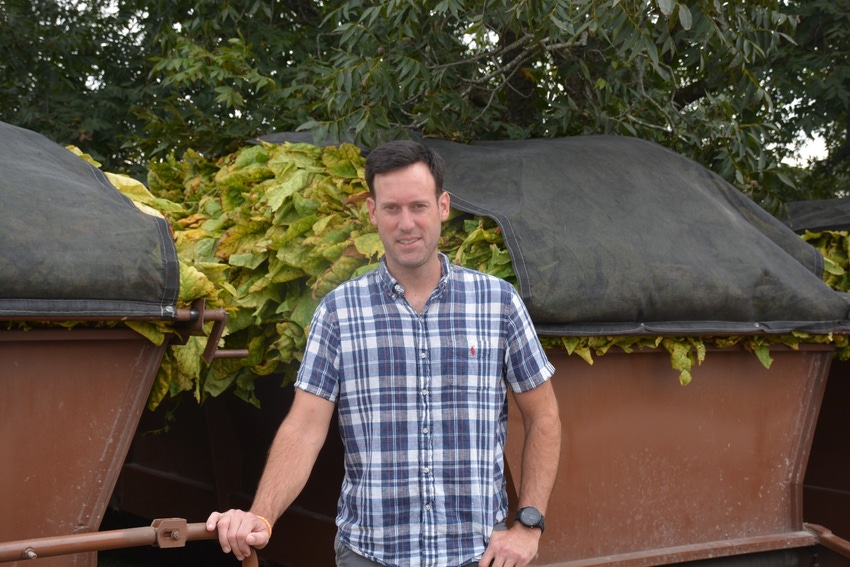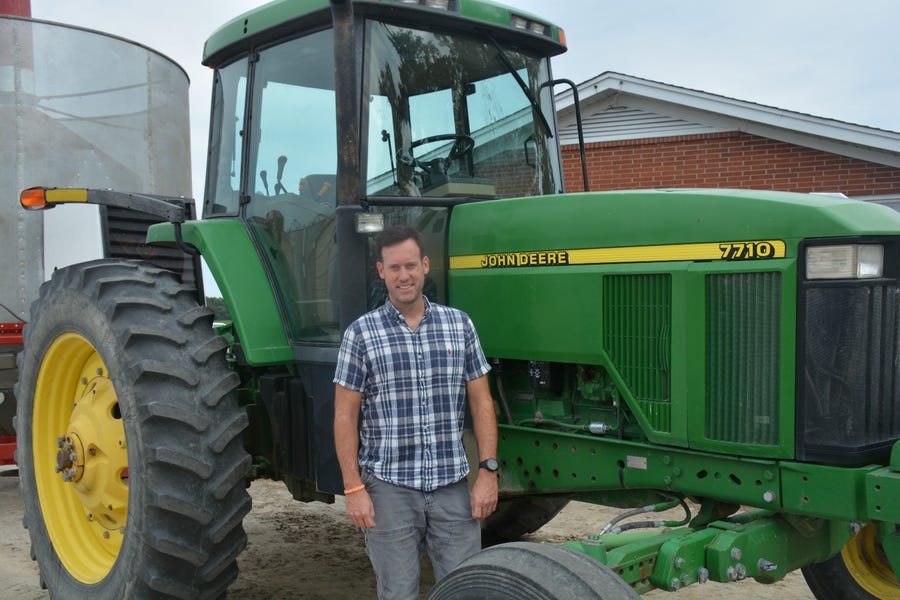
Rochester, N.Y., is long way from Rolesville, N.C., but Tim Kuhls left his hometown of Rochester after graduating from Greece Arcadia High School in Rochester to attend North Carolina State University in Raleigh where he met, dated and married Jenna Perry.
Jenna grew up on a farm not too far from the North Carolina State campus in Rolesville in northeastern Wake County where her father Ronnie Perry grows tobacco, soybeans, wheat and milo on roughly 1,000 acres. Perry Farms is a North Carolina Century Farm and the Perry family has farmed in Wake County for six generations, before the Civil War.
Kuhls didn’t grow up on a farm, but he got along well with his father-in-law and soon developed an interest in the farm and agriculture. After both graduating from North Carolina State, Tim with a degree in technical education in 2004, and Jenna, with a degree in biology with a concentration in nutrition in 2007, the two were married in 2010. The couple moved to Columbus, Ohio, where Jenna earned a master’s degree in medical dietetics from The Ohio State University in 2011 and Tim took a job at Atlas Copco, an automotive assembly solutions company.
After Jenna graduated from Ohio State, the couple returned to North Carolina where Tim continued his career with Atlas Copco and Jenna went to work as a clinical registered dietitian. Jenna is now a full-time mom, raising their three sons, Mason, 7; Levi, 4; and Sawyer, 2.
For Kuhls, the farm was always calling. He helped his father-in-law tend the crops and in 2017, he became directly involved in the operation. Through it all, Kuhls had a great interest in craft brewing where he brewed his own beer at home. He thought malting barley for craft beer and distilling would work well on the farm and approached his father-in-law with the idea who let him to try his luck.
Finding market for barley
Kuhls grew a 15-acre test plot of barley in 2015 and learned much from the trial. Barley did work well on the farm so in 2016, Kuhls expanded barley to 25 acres. The challenge, however, was finding a market. That’s where Epiphany Craft Malt in Durham came to the rescue.
David Marshall, a well-known USDA small grains breeder at North Carolina State who worked closely with Kuhls as he went in to barley farming, told him about Sebastian Wolfrum, a maltster and brewer originally from Germany, who launched a new business, Epiphany Craft Malt, in Durham in 2015 to serve the burgeoning craft brew industry in North Carolina.
Kuhls reached out to Wolfrum and the two agreed to work together where Kuhls would grow barley for Epiphany to malt for craft beer. Both were just getting started and both felt they could work well together to help Kuhls produce marketable malting barley. “Sebastian stuck with me and was there every step of the way, rooting for me,” Kuhls said.
It took three years, but in 2017 Kuhls finally was able to produce the high-quality malting barley that Epiphany needed to sell to the local craft brewers across North Carolina. They have worked well together ever since. Today, Kuhls provides both high quality wheat and high-quality barley that Epiphany malts and markets to craft breweries and distilleries across the state.
Tobacco still remains the money crop for Perry Farms. Kuhls says. Malting barley works great as a value added cover crop for tobacco. This year, Kuhls plans to grow75 acres of barley and 50 acres of wheat, all under contract with Epiphany Craft Malt.
“Tobacco has always been the big crop here in the Old Belt, but we grow a combination of tobacco followed by small grains, usually wheat, followed by no-till soybeans and maybe milo or grain sorghum. We use a three-year rotation with tobacco in the third year,” Kuhls explains.
The family looks at malting barley as a high-value specialty crop to add new value to the stream. “It increases the value of the cover crop, that’s where malting barley fits for us. We use it as a value-added cover crop while preparing the land for the next round of tobacco,” Kuhls says.
Good future demand
Kuhls would like to increase his malting barley and malting wheat acreage if the demand is there. He sees good future demand as the local craft brew industry grows as does the demand for locally grown barley and wheat.
“Our priority is to make sure we grow a very good quality crop. Local is good, but not if it’s not a quality product. We have to have the high quality first and by the way we are also local,” Kuhls explains.
Like all crops, malting barley has its challenges to grow. Big yield isn’t the name of the game, high quality is. Still, Kuhls says it is the challenges that make malting barley fun to grow. He plans to stay with the crop as long as there is a customer to buy his grain.
Kuhls buys his seed from White Hat Seed Farm in Hertford, N.C. At first, he planted the variety Endeavour that came out of Idaho. “The problem with Endeavour is that a lot of dormancy has been bred out of the grain. Once it’s physically mature, as soon as it gets wet, it wants to germinate, even if it’s still in the field. In our climate in May, we are going to get rain,” Kuhls says.
Kuhls turned to the variety Violetta, a European strain from Lima Grain Cereal Seeds, that has dormancy bred in, but handles humidity and moisture better than Endeavour. Violetta is also the preferred variety for Epiphany Craft Malt because of its malting quality.
Like all crops, management of pests and weeds is critical. Kuhls and Perry use an integrated pest management program on barley and their other crops. The biggest challenge is post-harvest handling.
Consistently good crop
“We’ve been able to grow a consistently good barley crop. But the post-harvest handling was probably the biggest learning curve because it’s a seed. When you’re going to germinate and malt it, you’re producing a seed product rather than a feed commodity,” Kuhls explains.
“Post-harvest handling in the bin is really important to maintain high germination. You need to try to find a way to manage the heat and the humidity inside the bin, both which are detrimental to the germination rate. That’s been a challenge: Figuring out in our climate how can I cool a bin and keep air flow in there when its 98 degrees outside and 90 percent humidity,” he says.
Epiphany buys barley in a one-ton tote, which is different than simply delivering the grain in bulk to the grain elevator. Bagging and cleaning the grain before delivery to Epiphany Craft Malt is also a challenge for a small farm.
And by all means, agronomic challenges are there. Managing diseases and fusarium blight is critical, while carefully managing nitrogen applications is a must for both malting barley and malting wheat.
“We want to achieve a good yield but avoid too high a residual protein content. That is a challenge. You can’t treat it like a feed wheat or barley crop. High protein levels are actually bad for beer, it makes it gelatinous during mashing, which is not good for brewing or distilling. You want a lower protein content for malting barley and malting wheat,” Kuhls says.
“It’s a balancing act. If you hit it with nitrogen, like you normally would, you get your yields way up, but your protein levels also go way up, so you can’t sell it for malting. We worked with North Carolina State on a trial plot on our farm, looking at different nitrogen rates at different times to see how the different rates affected yield and protein,” he notes.
Any type of mold or fusarium impacts malting quality so managing high humidity and mold is vital. “You need to keep mold out of the grain as much as you can. When the malting process starts, your saturating the grain with water and creating this environment that mold really thrives in,” Kuhls says.
Kuhls advises other farmers to approach growing malting barley cautiously. He says the most important thing to do is to have a buyer lined up before you plant malting barley or other malting crop. Plus, being a student of the crop is a must.
“When looking at an enterprise budget for something like malting barley, you have to remember that it doesn’t come anywhere near a cash crop like sweet potatoes or tobacco. But it does increase your return as opposed to a feed or cover crop. One acre of malting barley, if your able to achieve high quality and achieve malting grade, is like having two acres of conventional wheat for feed,” Kuhls says.
Kuhls plans to keep producing malting barley and malting wheat but acknowledges it will likely remain a small part of the operation. Still, Kuhls hopes the farm will still be there for future generations, which is a challenge because Wake County continues to become more urbanized.
Kuhls and his wife Jenna want the farm to remain in the family for their sons and twin nephews to take over if that’s what they want to do. After all, the farm has been in Jenna’s family for generations. Farming certainly has its many challenges, but Kuhls hopes the land continues to produce crops in a rapidly growing Wake County.
“Whether we make it to the next generation or not is about how many little things we can put together to carry on,” Kuhls says. “It’s less about me and more about my wife, her family legacy, our three boys, and their twin cousins. If farming is something they want to do, I am going to do my best to make sure it’ll be here for them one day. I see value-added crops grown for food and beverage as one small way to make that happen.”

Tim Kuhls has found success growing malting barley and malting wheat for Epiphany Craft Malt in Durham, N.C., which sells malt to craft breweries across North Carolina.
About the Author(s)
You May Also Like






